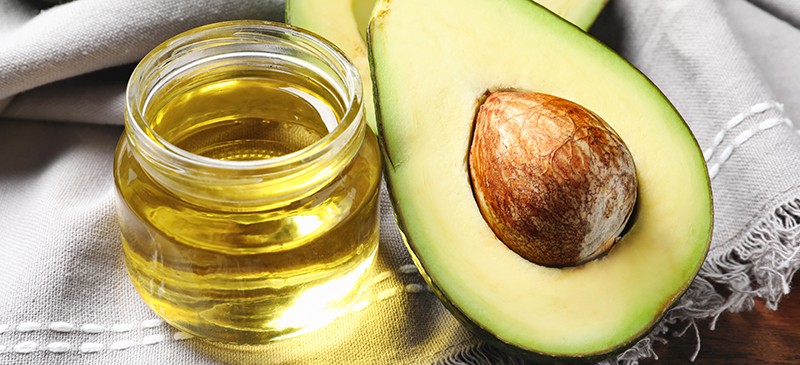
You love to cook with avocado oil … and it’s even improved your dry skin, but have you tried avocado oil for hair? Using avocado oil in your daily hair care routine is a surefire way to decrease dryness and improve texture no matter your hair type.
It’s totally natural, it’s very affordable and it’s likely already in your home. Is it time to consider avocado oil as your new go-to hair oil?
Health Benefits
Avocado oil comes from pressing the inner flesh of an avocado fruit. As you may already know, avocado and its oil are rich in beneficial nutrients that can boost your health, both inside and out.
Is avocado oil good for your hair? Avocado oil is a rich source of essential fatty acids including oleic acid, a monounsaturated omega-9 fatty acid, as well as linoleic acid, a a polyunsaturated omega-6 fatty acid.
The fatty acid content of avocado oil is one of the main reasons why it can do so much to improve dry scalp and hair conditions. It naturally conditions and strengthens the hair, leaving it healthier and shinier.
Let’s take a closer look at the many benefits of avocado oil for hair:
1. Protects Hair From Damage
According to a scientific paper published in 2015, “Oils play an important role in protecting hair from damage. Some oils can penetrate the hair and reduce the amount of water absorbed in the hair, leading to a lowering of swelling … Applying oil on a regular basis can enhance lubrication of the shaft and help prevent hair breakage.”
One of the main avocado oil benefits for hair is its ability to coat the hair with fatty acid-rich moisture and protect it from damage. Common causes of hair damage include exposure to sun, seawater or chlorine. Before spending time at the beach or pool, you may want to consider coating your hair in avocado oil to prevent the drying affects of these environments.
Another very common source of damage is use of hot hair tools such as a blow dryer or straightener. Applying avocado oil to the hair before the use of these tools can act as a natural heat protectant.
Hair coloring treatments can be yet another source of damage. Using avocado oil as a hair conditioner or mask after treatment can go a long way to prevent dry and brittle hair as a result of bleaching or coloring.
2. Aids Hair Growth
While research hasn’t necessarily shown that avocado oil can promote hair growth, it is a nutrient-rich oil that can help to boost the health of hair when used internally as well as topically.
It can also work as a natural hair growth aid when it’s used as a carrier oil for essentials oils like rosemary oil and peppermint oil, which have both been linked to the prevention of hair loss and promotion of hair growth.
You can also combine more than one carrier oil with multiple essential oils as a DIY remedy for thinning hair. For example, you can mix essentials oils of rosemary and peppermint with carrot and avocado oil for hair growth.
3. Keeps Hair Knot-Free
It’s never fun when hair gets tangled. This can especially be a problem for kids who don’t like to brush their hair, but it commonly affects adults too.
Fine hair can become knotted very easily. Weather conditions such as a windy day can also leave hair in knots. Dry hair can also become knotty.
READ RELATED: This Sunscreen Has Been My Holy Grail for Dewy Skin This Summer
Putting a small amount of avocado oil in the hair before brushing can help to keep it moisturized and knot-free. It can also help to detangle it.
4. Improves Dandruff
Dandruff is a skin disorder affecting the scalp that results in excessive shedding of dead skin flakes from the scalp. Having skin that is too dry or too oily can both contribute to this common concern.
Using a natural oil like avocado topically can help in both situations. If the skin is too dry, avocado oil provides nutrient-rich moisture, or if the skin is too oily, the application of oil can signal to the skin’s oil glands that they don’t need to produce so much oil.
To improve or prevent an itchy, dry, flaky scalp, it can help to massage natural oils like avocado into the scalp regularly. You also can combine essential oils like rosemary and tea tree with castor oil and avocado oil for hair growth as well as dandruff control.
Avocado Oil for Hair Uses
There are so many potential avocado oil uses for hair. It’s great for all kinds of common hair concerns.
How to use avocado oil for hair:
- As a hot oil treatment: Forget those store-bought hot oil treatments with a bunch of unnatural and questionable ingredients and simply apply some warmed up avocado oil to your scalp and hair. Cover your head with a shower cap or towel and let it sit for 30 minutes before washing and conditioning as usual.
- For scalp massage: Scalp massages are so relaxing and therapeutic, and avocado oil is perfect for using on the scalp (or body) for a massage.
- As a natural hair mask or conditioner: Depending upon your hair goals, you can either coat your entire scalp and hair with avocado oil, or you can apply it just to the ends. Leave the oil in your hair for 15 to 30 minutes, or you can even leave it in overnight.
- To tame split ends or flyaways: Rub a drop or two of oil between your fingers and apply to areas of concern. If you have fine hair, it may only take one drop to do the job. You can always add more, so start off with a smaller amount and see how that works out.
- As a heat protectant: Before blow drying your hair or using other heat-producing hair tools, rub a dime-size amount of avocado oil into your hands and apply it to your hair, paying special attention to the ends. You can use your fingers or a comb to spread the oil throughout your hair.
- As a carrier oil to promote hair growth or decrease dandruff: Use avocado oil as a carrier oil with essential oils to target specific hair concerns like thinning hair or dandruff.
How long do you leave avocado oil in your hair? If you’re performing an avocado oil hair treatment or using avocado oil for dandruff, it’s best to leave the oil on your scalp and in your hair for about 15 to 30 minutes so it can really soak in. If your hair is severely dry or damaged, leaving avocado oil in for a longer amount of time is a good idea.
If you’re using a small amount of avocado oil as a heat protectant, split end treatment or flyaway tamer, then you only need a drop or two of oil to put in your hair when it’s either wet or dry — and simply leave it in.
If you’re wondering how to make avocado oil for hair growth and other uses, it is possible to make avocado oil at home. But it’s also very easy to find 100 percent pure avocado oil in your local grocery store, health store or online.
Coconut Oil vs. Avocado Oil for Hair
If you’re comparing avocado oil versus coconut oil for hair, you can use the two oils in a similar fashion for your hair and scalp.
For hair dryness, split ends, flyways and knots, you really can’t go wrong choosing either oil, because both will provide moisture that will help to improve these common hair concerns.
Both coconut oil and avocado oil can be used to moisturize the scalp to improve dryness and dandruff. Dandruff is commonly caused by yeast-like fungal (Malassezia) infections. If dandruff is a main concern, then you my want to opt for coconut oil — because many studies have shown its antiviral, anti-fungal and antibacterial properties.
Risks and Side Effects
It it possible to be allergic to avocado and avocado oil. If you have an allergy or sensitivity to avocado, avoid using avocado oil internally or topically.
It’s a good idea to perform a patch skin test before using avocado oil for hair and skin to make sure you don’t have any unwanted reactions.
Final Thoughts
- Avocado oil is a natural and affordable way to boost the health of your hair.
- Avocado oil benefits for hair include improving dryness, split ends, flyaways and knots.
- Look for 100 percent pure avocado oil for cooking and topical use.
- Avocado and coconut oils can be used similarly for the hair, but if dandruff is a main concern, the anti-fungal properties of coconut oil make it a more therapeutic choice.
Source: Dr. Axe






